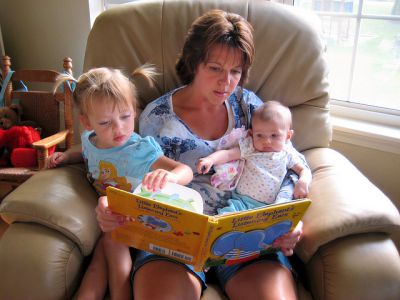Reading aloud is one of the best kept secrets. It has tremendous impact on the child’s mind and helps them gain a good start on their education and learning. It also supports children to become emergent readers through the use of repetitive listening and using familiar words while reading.
Pre-reading skills, such as reading from left to right, turning pages as you read, and understanding that letters make the words that make up stories, are critical for emergent readers to learn prior to their first day of school.
Reading teaches sharing and involvement. It brings family ties and makes the child feel loved and bonded. Reading always brings closeness and supports the child and the reader to develop relationships. When someone reads to a child, they are exposing that child to more than just the words on the page; they are demonstrating proper speech patterns, the basics of how a book is read (i.e., from left to right, top to bottom, etc.), and the excitement that reading can bring. Other benefits also include the following:
- Active reading stimulates language development and encourages original thinking.
- It contributes in enhancing speech and communication skills.
- Repetition improves vocabulary and memory.
- Early reading to toddlers helps in mastery of language which helps them as they approach the school age.
- Helps in understanding concepts, applying logic, develop judgement skills.
- Helps the child to deal with stressful situations in their development milestones.
- Improves the attention and concentration which helps in school.
- Helps Bonding.
- The colours, textures and sound in books will help accelerate baby’s mental growth and awareness of surroundings.
Whether you read to a child before bed or when they get up in the morning, incorporating reading habits into a child’s routine and begin finding the wonders and miracles in them.
When to Start Reading
It is never too early to start the path of reading to a child. Reading to the 7 month fetus in the womb itself responds to the sound by kicking and moving. When a child is born, their brain is not completely developed and will continue to develop over the course of their first year of life. Reading to an infant helps create brain-pathways and lay the groundwork for language development.It can be started when the baby is six months old or even earlier.
Start reading aloud sooner. Make it habit. It doesn't matter when you read , but it is helpful to do it in the same time each day, for at least 15 minutes. Besides mother, children enjoy being read to by other people also like father, brother, grandfather or even friends. Today as both parents often work and may not be able to read frequently, baby-sitters, child-care providers or older siblings can sometimes help in reading. Research shows that growing up in a house filled with books often supports a child to become an early reader.
Choosing Books
There a wide variety of books to choose from for young children and even for the older ones. Share different kinds of books with children such as people, events or based on a child’s interest and they can enjoy different kinds of reading experiences. Some books help children build confidence as they join in with a repeated rhyme. Books about familiar objects are reassuring to young children, while books with unfamiliar topics can excite them about new ideas and places. When choosing books for children you should also consider:
- Choose books appropriate to the age, interest and the ability of the child.
- Infants and toddlers enjoy simple picture and story books about familiar objects. The shapes and colours draw child’s attention.
- Infants have a tendency to put books in their mouth, therefore choose board books or cloth books.
- Preschoolers like action books, fantasy stories, poems and tales about animals and everyday experiences.
- Young readers enjoy books about their hobbies and interests.
- Older children go for humour, folk tales, longer poems and more complex stories. Mysteries are also popular.
Strategies While Reading
Here is a list of strategies to boost a child’s reading experience:
- Pick up books with large prints.
- Point at each word as you read it.
- Read favourite books over and over again.
- Read stories with rhyming words and repetition. Make the child join you.
- Try to involve the children in the middle while reading. Leave out a word in the middle and wait for the child to say it.
- Ask questions in the middle and allow them to guess the ending.
- Incorporate calm, unhurried reading in the night time, which helps in restful sleep.
- To make the reading lively, first spark your child’s interest. Allow them to explore the cover before reading. Next point out the pictures in the book. When finished ask them what they liked the best about the story.
- Read expressively, using varied voices and tones as per the character.
- Use puppets, finger plays etc while you read.
It is always not required that the child must sit in one place and listen. The child may be involved in various other activities like playing with his toy or colouring still they would listen to your voice.
As you begin collecting books you can start a home library which can be racked, display books on a table or create a book basket. The idea is to keep the books reachable for the kids. Some books can be kept even in your car.
Books don’t need to be expensive. Low priced children’s books are available in most stores. You can exchange books with families and friends or go to the library. Ask relatives to give books as gifts or you can start a birthday tradition of gifting your child with a special book to start up a collection.







 Open ended questions cannot be responded to with one word answers such as yes or no. These types of questions enables a child to provide
Open ended questions cannot be responded to with one word answers such as yes or no. These types of questions enables a child to provide During your child’s preschool years, an important milestone begins to emerge. This is the development of pre-writing skills. Pre-writing skills are used to encourage, develop
During your child’s preschool years, an important milestone begins to emerge. This is the development of pre-writing skills. Pre-writing skills are used to encourage, develop Open ended materials enables children to play freely. They are objects that have no rules to follow, use or function. Raw materials that can be
Open ended materials enables children to play freely. They are objects that have no rules to follow, use or function. Raw materials that can be An Acknowledgment of the Country is a way of showing respect for the Traditional Owners and can be given by both non-Indigenous people and Aboriginal
An Acknowledgment of the Country is a way of showing respect for the Traditional Owners and can be given by both non-Indigenous people and Aboriginal Language plays an important role in a child’s development. It enables a child to communicate effectively with their family, learn at school, socialize with friends,
Language plays an important role in a child’s development. It enables a child to communicate effectively with their family, learn at school, socialize with friends, Like adults, children have to deal with their own stress in life. Moving house, starting a new school, preparing for a new sibling - these are
Like adults, children have to deal with their own stress in life. Moving house, starting a new school, preparing for a new sibling - these are Playdough is such a versatile material. It provides numerous benefits to children as they manipulate it, it is safe and soothing and provides children with
Playdough is such a versatile material. It provides numerous benefits to children as they manipulate it, it is safe and soothing and provides children with Teaching children about sustainability enables them to appreciate and respect the natural environment. Early childhood services can provide meaningful hand on learning experiences in order
Teaching children about sustainability enables them to appreciate and respect the natural environment. Early childhood services can provide meaningful hand on learning experiences in order Recycling is an important concept that teaches children to care for the environment. It encourages children to be responsible and show a growing appreciating for
Recycling is an important concept that teaches children to care for the environment. It encourages children to be responsible and show a growing appreciating for When children apply paint to paper, glue things together, or pound a lump of clay, they experiment with colour, shape design and texture.
When children apply paint to paper, glue things together, or pound a lump of clay, they experiment with colour, shape design and texture.



